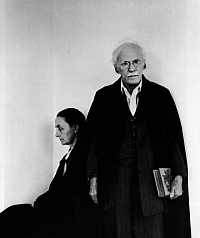I admit it.

"You're outside a book shop? You don't have a pension fund? KEEP WALKING!"
I was channel flipping.
Suddenly, there was Suze Orman, finger pointing toward me and head thrust forward like Uncle Sam or Lord Kitchener in one of those “Your Country Needs YOU” recruitment posters.
“. . . and remember,” Suze was concluding, “People first! Then money! Then things!”
That brief glimpse is all I know of Suze’s ideas on this topic but – like any good consultant, academic, or journalist – I’m going to seize hold of her idea and gratefully make it my own
Gifted adults and the meaning of money
I’m fortunate in that I have the kind of practice that literally covers the financial universe.

Gifted adults: all the same under the skin.
This is because my focus is on psychographics rather than demographics and because working over the telephone means I can work with a much larger client pool than most.
The common factor between the richest and the poorest, the highly energized and the stuck, the tightly-focused and the confused, is their giftedness.
They share the same basic qualities – intuition, awareness, creativity – and are equally fierce in their insistence on maintaining autonomy, asserting their right to their unique vision, and holding on to their sense of identity and integrity.
Yet the financial manifestations of their giftedness vary hugely.
Gifted doesn’t mean gilded
To one gifted person a dollar is something to give to a charity. While to another it is something to add to their personal fortune.
These different actions appear to be at opposite ends of the spectrum but I’d suggest they both have a common source: the need for insurance – or reassurance.

The gold wall that keeps threats out can also imprison us within.
The giver protects himself from a fate worse than death by maintaining multiple layers between himself and the less-fortunate. The keeper protects himself by building a rampart of gold.
The under-performing gifted
Sadly, I think I have to say that the gifted community as a whole tends to underperform financially. This judgement is purely anecdotal and may just be a projection of my personal self-assessment.
However . . . how many times have we looked at someone and thought: “With all they have to offer, how come they aren’t doing better?”
So can Suze help?
Even the most motivated advisor cannot force their mentees to take action.
However, Suze can at least help make something conscious that might otherwise remain unconscious. And she can encourage us to think about our personal balance of money, people and things.
Gifted we may be, but blind spots and asynchronous development can certainly impede our path to greater riches in any one of those categories.
Where’s your emphasis?
What kind of gifted adult money-manager are you?
Let’s take a look at three different prioritizations for some clues:
Money-Things-People (MTP)
This is a popular hierarchy with all groups of people, gifted or not.

Gifted intensity and high success can lead to lofty isolation.
Why? I think it’s because a ‘money-first’ strategy simplifies decision-making. Also, the emphasis on tangible wealth is very acceptable – even highly admired – within society.
Some people condemn this prioritization as actually being anti-social or just plain ‘wrong’ . But it’s really a perfectly legitimate way to play life.
After all, possessions – things – are just toys and/or fetish objects. And we all have a need both to play and to feel secure. Acquiring them can be a lot of fun, too.
The risk for gifted individuals pursing this path is that they play fiercely when they play at all.
So their intensity and passion for capitalizing on every financial opportunity can drive away people whose commitment to the game is not so great.
This can result in the gifted-and-successful being denied access to the emotional and other resources that might help them live more richly than they can achieve on their own.
Things-People-Money (TPM)
It was hard for me to see how this prioritization might play out.
But then an image came to me of a collector. It was two images, actually. One was a collector at an art auction, spending millions, while the other was of a vast hall full of enthusiasts exchanging Star Trek memorabilia.

Walking the ridge on tip toe? Being captivated by objects can lead to danger.
In both cases, their passion for collecting was paramount in their lives and led them to gather with groups of people. In neither case was the accumulation of money privileged over the things or the people: they just had very different amounts of it.
Someone else who puts things before people and before the accumulation of money is the impulsive thief that takes jewels and other objects rather than cash.
A more altruistic version would be the kind of charity that accepts donations in kind and distributes them among the poor.
The truly gifted TPM person must be the artist, the creator of things. Unfortunately, the creative preoccupation is often to the detriment of their relationships with people and frequently with a total disregard for making money.
I suspect that many gifted individuals fit that picture . . .
People-Money-Things (PMT)
This, as Ms Orman suggests, is the most balanced ordering available to us.

Properly managed, one pool can feed a thousand plants.
To start from the bottom, if we take care of our money by being cautious in our acquisition of things, we’ll have it available for people when they – including ourselves – really need it.
And we won’t hold back from making any necessary expenditure: our stash will be ample and comfortably protected.
It’s surprising how far you can travel in the face of misfortune if you adopt this prioritization.
Which is a comforting thought, given that this order should be fairly easy for gifted individuals to sustain. Despite our fiercely maintained independence, we are often very people-oriented.
However, there is a risk that if your distribution of the three categories is, say, 90-6-4, then your over-emphasis on people is going to be damaging for you and ultimately for everyone else.
So make sure you have plenty in the pot before you give some away – whether to others or even to indulge some expensive need of your own.
And I’m not just talking about money here, but love and compassion, too.
The gifted cash box
I think that for most gifted individuals money is not something to be pursued, hoarded, collected, counted, and managed for its own sake.

I don't care what you do with it! Just shove it under the mattress!
Indeed, most of the wealthy gifted that I know find it irritating to have to deal with the money that’s come to them.
Whether this cash is a by-product of their joy and success at work or something they’ve inherited, its management – not the cash itself – is seen as an obstacle to getting on and doing more interesting, more valuable things.
Gifted people, I suspect, are not typically succesful investors. Their vision tends to be tied to their personal value system and therefore doesn’t resonate with the consumer tastes on which so much wealth depends.
And what about me?
Do I fit Suze Orman’s preferred profile?
Sadly, probably not. I do put people first, certainly, but I also have a tendency to buy things – especially books and boats – before I have my 12 months’ safety fund built up.
So this leaves my prioritization as:
People-Things-Money
But it’s a pretty close thing. Sort of 60-21-19.

"See what happens when a gifted adult meditates on money!"
I’ve done many motivational tests over the years and they all report that my interest in money is substantially below average. By that, they typically mean that money is not much of a driver for me.
This is true. But it’s not the same as saying I wouldn’t be happy to make loads of it doing something that was motivated by things closer to my heart.
For example, this country (the USA) spends $700 billion a year on ‘defence’.
I don’t want any of it if its goal is to bend others to our will.
However, I’ll be happy to take just one percent if its intent is to help others discover their own true will.
I think that would be a much more effective defence, as well.
And I would be gloriously rich.
So bring it on . . . .
Soon!
Christopher,
Just an observation: the statement you make with regard to the money-first people (“The risk for gifted individuals pursing this path is that they play fiercely when they play at all. So their intensity and passion for capitalizing on every financial opportunity can drive away people whose commitment to the game is not so great.”) applies to the other two categories equally well. The gifted play everthing “fiercely” and tend to alienate a lot of people simply because the people they play with can’t keep up.
I don’t know if this helps to illuminate anything… it’s just something that stands out for me.
From what I’ve discovered through reading and my own observations of myself, the gifted person’s psychology finds more meaning through people with things and money coming next. We are the compassionate ones that sometimes desperately try to find meaning in this world; in a current civilization that is highly materialistic.
“The giver protects himself from a fate worse than death by maintaining multiple layers between himself and the less-fortunate. The keeper protects himself by building a rampart of gold.” I personally don’t agree with this statement in regards to the charity part. I can only speak my truth when I say that charity is important in itself for me as it is the right thing to do. My views on charity could have been highly conditioned by the sheer number of books on Native American belief and Buddhism. Giving is not a cushion between myself and the less fortunate. This last recession proved how close to financial oblivion any of us can be. To best sum up what I feel, is that I treat others as I would want to be treated. As I give to other, I would hope that others would give to me. There is also joy in giving and seeing that we have made a difference to someone, people or animal alike.
Having a substantial nest egg is essential. Hopefully this last recession taught people how vulnerable we can be. Finding enjoyment with others versus the accumulation of things is very meaningful. However the media is pushing us a different way.
Just my two cents worth. It will be very interesting to see other replies. Blessings to all.
I believe in the principle of ‘pass it on’. I’m not sure where this fits into the picture that I’ve read here. There seems to be a fundamental absence of spirit and expansion. Things, money and people can both stop expansion as a human, as well as enabling it. I think my happiness comes come from my trust that there is a greater picture,- spirit. If I trust then people, things, and money can come and go into my life as my spirit needs for its development as a human being. So I pass on as many things as I can to keep my space as clear as possible both physically, mentally, emotionally and spiritually so that I have as much room for growth. I agree with Cindy that the joy of enabling another to make a difference in their life how ever they choose ( sometimes this can also be painful), is part of the enrichment of human spirit, This is what makes my world, to always be ready to consider passing things on.
Go well, Lynne
Hi Lynne and Cindy, I think I have oversimplified in two ways:
1) I had to decide at the outset that I was only going to address the mundane aspects of money. I actually find the spiritual and energetic aspects to be more interesting and more compelling and in that domain I think you’d find me pretty well aligned with both of you.
I’m not sure my faith is as strong as yours, Lynne, though I think I”d like it to be. Perhaps a future blog entry might deal with ambivalence in that regard; and
2) In my bald statement about giving being a form of insurance I was being a bit ingenuous or provocative – or lazy! In one way we could argue that all acts designed to improve the universe have a personal insurance quality but that’s not all that I mean. I think I was after identifying the fear factor – often unconscious – in how we manage money and how that might manifest in different ways. There is also, of course, a love factor that finds its expression in the kinds of acts that Lynne describes as having the potential to generate pain.
Thank you both for your thoughtful contributions.
That is an interesting observation, John, and one I hadn’t thought of. It would be interesting to research whether the triumphant people-first strategies of a Mother Theresa or an Albert Schweitzer might actually have discouraged others from trying to be as helpful.
Money is my enemy and my teacher. I seem always to be on the edge but have yet to fall off without a branch to grab on the way down. I do fantasize about winning the lottery so that I could paint, write, travel to experience other parts of the world, etc. What freedom it would be if I were able to take a class or attend a workshop just for fun. However, I learned early on that my people were poor and I owed it to them not to leave them in the dust. Since I left them behind in so many other ways that were not so revealing. I suspect I’m on the edge of poverty here and there in order to avoid angering the Gods. How is it that we humans have created a situation for ourselves that requires that our very survival depends on an unnatural commodity like money. Long ago on the way home from work I would get off the bus early in order to walk across a park. Since I was not happy with my job and felt very much like an indentured servant I would watch the birds and squirrels enjoying their lives without the need for money and wonder why we humans have created such a situation for ourselves.
Hello,
I caught that you also have a tendency to spend money whilst trying to save it. I can definitely relate as I have observed a “People, Things, Money” lifestyle as well. Just curious if you also have the feeling as if you wouldnt mind not having money as long as it meant you could still acquire the items you dearly appreciate without needing money at some point or another. Am I right?